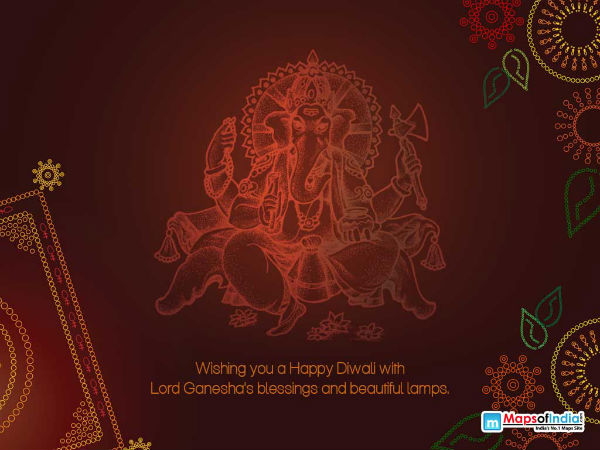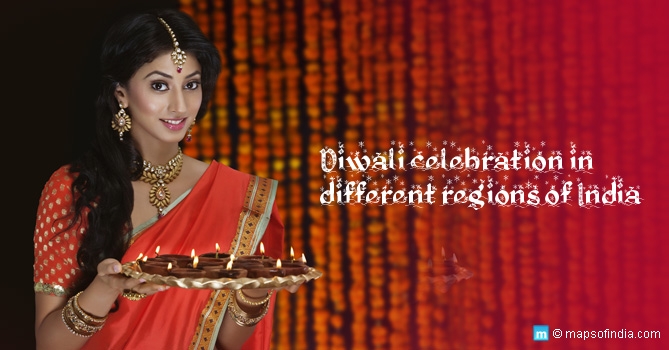Diwali or Deepavali is the festival of lights which is celebrated with full enthusiasm and energy across India. The word Diwali has originated from a Sanskrit word deepavali, meaning row of lights. Diwali is celebrated on the new moon in the Kartika month that falls in Oct-Nov each year. It is a four-day festival in which the main festival falls on the third day and the fourth day is celebrated as a new year by the merchants.
The Four Days of Diwali
- Day 1: Dhanteras: This day markes the beginning of the festival of Diwali. It is believed that on this day, Lord Dhanwantari came out of an ocean with Ayurveda for the well-being of humans. Traditionally, people bathe at sunset and lit lamp around Tulsi plant and pray to Lord Yama. People buy gold, jewelry and utensils on this day, as buying is considered auspicious and related to wealth.
- Day 2: Narak Chaturdashi: The second day is also known as Kali Chaudas or simply Choti Diwali. It is also the day when Lord Krishna killed demon Narakasura and freed the world from his fear. Ritual of special bath such as oil bath is practiced in some regions. It is believed that on this day one should not lit diya inside the house.
- Day 3:Deepavali: It is the main day of Diwali when Goddess Lakshmi along with Lord Ganesha is worshipped. People pray the gods to achieve blessings of wealth and prosperity. Houses are decorated and lighted with lamps and candles. People also decorate their homes with Rangoli. There is a belief that Goddess Lakshmi roam on earth on Diwali night; therefore, people light diyas and candles to invite her to their homes. The day also coincides with the day when Pandavas returned from the forest.
- Day 4: Govardhan Puja and Padwa: The fourth day of Diwali is known as Govardhan Puja. According to a mythological tale, Lord Krishna lifted the Govardhan Mountain to save people. In Western states, the festival is celebrated as New Year’s Day as per their calendar. In North, it is also celebrated as Vishkarma Day, when people worship their arms, machinery and instruments.
- Day 5: Bhai Dooj: This day is also known as Yama Dvitiya, which shows the bond of love between a brother and his sister. Sisters send invitation to their brothers to visit their homes.
Various legends regarding the origin of Diwali
Various mythological legends have been attributed to the origin of Diwali.
- The most widely known legend is that of Lord Rama. It is the same day when Lord Rama returned to Ayodhya after completing his exile of 14 years and defeating Ravana.
- It is the day on which Lord Krishna killed the demon Narakasura.
- Mythological legends also say that Diwali is celebrated to observe the marriage of Lakshmi and Lord Vishnu.
- Diwali is also the birthday of Goddess Lakshmi. The Goddess was incarnated on Amavasya (the new moon day) in the month of Kartik. She appeared during the churning of the ocean.
- One of the greatest Hindu kings, Vikramaditya, was also coronated on the day of Diwali.
- People from the Arya Samaj celebrate Diwali because Maharshi Dayananda, founder of the Arya Samaj, attained nirvana on this day.
- Mahavir Tirthankar, founder of Jainism, attained nirvana on Diwali day.
- Sikhs celebrate Diwali because the foundation stone of the Golden Temple was laid down on this day in 1577. Also on this day, the sixth Sikh guru, Guru Hargobind, helped 52 other princes to get release from jail in 1619. The return of Guru Hargobind is celebrated by Sikhs by decorating the Golden Temple with lights. Diwali at Golden Temple, Amritsar, is a must-see because of illumination and fireworks.
Spiritual meaning of Diwali
Diwali is not just limited to lighting lamps and diyas but its actual meaning is more than this. This is the festive season to spread happiness. It is the time to strengthen the bond with your loved ones and friends.
Everyone cleans up their homes and illuminates them with electric lights, earthen lamps and candles. This Diwali, not only illuminate your home but also your inner self and soul.
Celebrate this occasion by doing charity. Make others a part of your celebration so that world around you becomes happy.
Diwali Rituals
Rituals in India vary by region, and same is the case with Diwali. But irrespective of region, Lakshmi Pooja (worship of the goddess of wealth) is performed by all. Also, Lord Ganesha, the one who removes all the obstacles of life, is worshiped on the third day. It is believed that Goddess Lakshmi visits the cleanest house on Diwali, which is why people clean their homes before Diwali.
Significance of Lights and Firework
Lights depict happiness and a way to express gratitude for good health, wealth and prosperity. Fireworks signify a joy of people living on the Earth and loud noise is a way to tell God about the same. Scientifically, the smoke produced by crackers and fireworks kills mosquitoes and insects developed during rainy season.
Related Information:
About Diwali
Free Download Diwali Wallpapers and Images
Diwali Aarti
Celebration of Diwali
Diwali Gifts Ideas
History of Diwali
About Diwali Puja
Story of Diwali
Lakshmi Puja Timings on Diwali
Revival of Earthen Diyas this Diwali
More Offers on Cars and Bikes This Diwali
E-commerce Set To Soar This Diwali
About Dhanteras
Dhanteras And Diwali Expectations
Essay on Diwali for students and teachers





